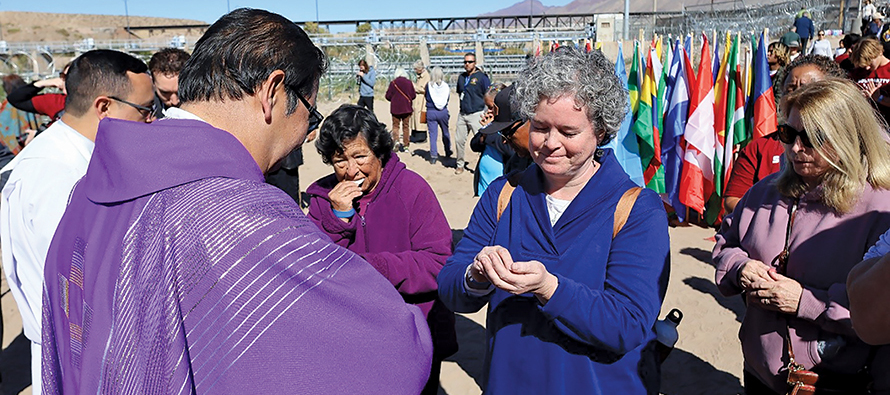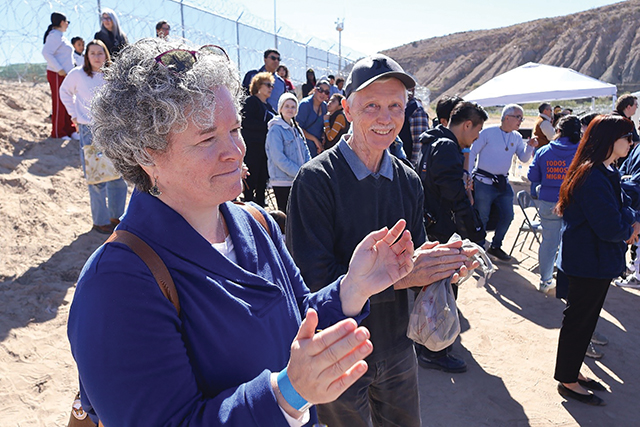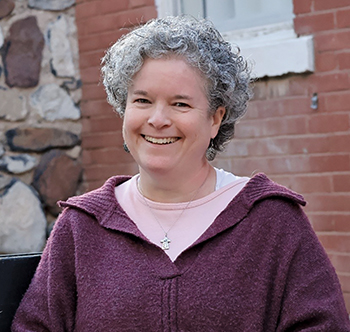Missioned to make connections

Sister Deirdre Griffin, S.S.J. receives Communion during a Mass held on a platform in the Rio Grande Canal between El Paso, Texas and Juárez, Mexico. Worshippers gathered on the riverbanks on both sides to pray for migrants. (All photos by Jennifer Tomshack, courtesy of Maryknoll Lay Missioners)
MASS KIDNAPPINGS are not uncommon for those traversing Mexico to reach the U.S. border.
Gangs affiliated with drug cartels have created a large-scale extortion racket that involves kidnapping migrants, smuggling them into Texas, California, New Mexico, Arizona, and elsewhere, and holding them for ransom in an attempt to get the migrants’ families already in the country to pay.
Lorena was one of those migrants.
She couldn’t run as fast as some of her fellow travelers because she was heavily pregnant. The kidnappers caught her, blindfolded her, and held her captive in a stash house. While waiting for her husband in New York to pay the ransom, Lorena went into labor and gave birth in that house.
The kidnappers eventually released Lorena and her infant in a public park in El Paso.
A kind stranger brought Lorena and her baby to the hospital, which then connected them with Annunciation House [of hospitality] and Sister Deirdre Griffin, S.S.J., a sister of St. Joseph who serves there.
First, she listened at length to Lorena’s story. Then, Griffin got busy.
Besides helping new arrivals like Lorena with shelter, food, and clothing, Griffin uses her skills as an immigration lawyer to troubleshoot legal knots, such as the fact that Lorena’s child was born in the United States but not in a hospital, leaving her without a birth certificate. Griffin helped Lorena secure a birth certificate for her child and filed an asylum application for Lorena. Newborn in her arms, Lorena reunited with her husband in New York to await her asylum hearing.
Stories like Lorena’s are typical, says Griffin. Those who cross the border under duress are invariably traumatized. First, they’ve experienced trauma in their home country, which has prompted them to leave. Then, many endure violence en route to the United States. When they arrive, they are exhausted, dehydrated, and disoriented. And that’s when some are kidnapped. Others are found by U.S. authorities and held captive in detention centers.
Griffin says she has learned to do emotional triage to suss out how much legal information the people she ministers to can mentally handle in the moment. She begins with lots of listening. Then she helps them understand they are welcome and safe in the company of those where Griffin works: Annunciation House and Las Americas Immigrant Advocacy Center.
“It is my honor—a sacramental encounter with Christ—to assure, orient, and encourage each person along their journey,” says Griffin.

From Boston to the border
Griffin is herself the daughter of immigrants—from Ireland. She grew up in Medford, Massachusetts, a suburb of Boston. She was the first person in her family to go to college, graduating in 1993 with a degree in government and legal studies from Bowdoin College in Maine.
She served in the Jesuit Volunteer Corps and then earned a law degree from Boston College in 1999. She worked in private practice of immigration law. And she fell in love—with an Irish dancer like herself.
The relationship was a happy one—and also “a great experience of discernment,” she says.
“He was from a small rural village in Ireland and wanted to return to build houses. I knew if I went with him, I would want to focus on raising a family.”
But, she says with a laugh, “Jesuit Volunteer Corps ruins you! Once you taste it—living simply in community, doing social justice work—you become hungry for that life.” So she made the difficult decision to end the relationship and pursue the life that was beckoning her, not knowing right away where it would lead.
An early step in her discernment journey was onto the most important springboard of action—prayer. She had been taught by Sisters of St. Joseph in grade school and high school. She remembered a former teacher of hers saying, “The world needs generous women like you.” She decided to reconnect with the sisters.
Griffin prayed with their community in Boston once a month for two years. Eventually, one of the sisters said to her, “So what are we doing? Are you thinking about religious life?”
It was the nudge she needed, and she became a candidate, an early step toward becoming a sister. Living in community and practicing law simultaneously was “intense and demanding,” says Griffin. “I was living two lives in one day.”
She was also struggling with the sense that this particular community wasn’t the right fit for her. Three years after making first vows with the community, she stepped away from religious life for a couple of years.
The call continues
Then, after moving to Springfield, Massachusetts to work in language access services at the Massachusetts Trial Court, she became acquainted with a different group from the same tradition in religious life: the Sisters of St. Joseph of Springfield, a congregation of about 130 women.
She was drawn to the way this particular community was so rooted in their mostly Spanish-speaking neighborhood. The congregation has decades-long roots in education, but had also branched into social services and prison ministry.
Griffin joined them as an agrégée, a woman who is a member of the Sisters of St. Joseph community but does not take vows like a sister.
During her three years as an agrégée, Griffin directed the refugee resettlement program at Jewish Family Services of Western Massachusetts in Springfield. That experience, from 2014 to 2018, was a profound one for her of “offering the radical hospitality of God through welcoming people seeking safety.”
In 2018, Griffin took the leap to formally enter the congregation as a novice. She had committed to a life of service as a sister, and now her commitment to migrants and refugees was evolving.
Griffin chaperoned students on an immersion trip to El Paso, Texas in 2019—and learned about the Maryknoll lay missioners working at the border. She was intrigued by their work and knew she could be of service there. As the COVID pandemic receded in 2021, she felt increasingly drawn to serve with the Maryknoll lay missioners at the border. When she proposed it to the Sisters of St. Joseph, they said, “Go for it.” The leaders of her community approved the affiliation with Maryknoll Lay Missioners because the group shares the sisters’ mission, which Griffin describes as “to connect neighbor with neighbor and neighbor with God.”
“It was such a graced moment. They missioned me here, and I’m sustained by their prayers and regular contact with them. It’s why community life is so awesome.”
Thus, Griffin, a Sister of St. Joseph, became a Maryknoll lay missioner at the border, and she plans to continue indefinitely. In 2023, she made her final vows as a Sister of St. Joseph of Springfield.
Steadfast in service
It could become harder for missioners at the border to do their jobs. It could even become a crime—and Griffin says she is ready to live into what she professes.
In 2024, the Texas Attorney General made two attempts to end Annunciation House’s mission to serve those in need whether or not they have documents. Maryknoll Lay Missioners expressed solidarity with and support for Annunciation House, where Griffin serves people like Lorena. El Paso’s Bishop Mark Seitz has given steadfast support as well.
But it doesn’t have to be this hard, says Griffin, who deals daily with desperate needs. She notes: “It would financially be a lot more efficient to invest in welcoming people and training them to fill the jobs that we need filled, instead of spending millions of dollars on this border industrial complex that is only getting more militarized.
“The extreme political divisiveness in the United States at this time invites us to begin instead in the work of hospitality, of God’s radical love for each and every creature.”
Life of joy
Griffin’s ministry can seem like a paradox. “Ministry at the border is both heartwarming and heartbreaking,” she says. “Days are very full, so it’s important to maintain a sense of rhythm to stay nourished and grounded for the work of accompaniment.

“I am very intentional about taking time for reflection, and in my free time I explore the vibrant arts and cafe culture here in El Paso. My spirit comes alive with traditional Irish music and dancing. While there is not much of that in far west Texas, there is traditional Mexican music, which makes my heart happy, and often features accordions, which I love. Truth be told, I have a soft spot for an accordion in any language.
“One of my favorite things to do is to get out into the mountains, both at McKelligon Canyon, where I go for silence, and also hiking Mount Cristo Rey, which is just north of the city and a place where many migrants cross at the point where Mexico, New Mexico, and Texas meet.”
Community also provides grounding when the heartbreak ratchets up. Women religious from a variety of congregations from around the United States and the world are ministering in El Paso. “We develop relationships with one another and support one another daily,” Griffin says. “And I stay in touch with my Sisters of St. Joseph community in Massachusetts through regular phone conversations and Zoom meetings, and the newer Sisters of St. Joseph around the United States gather regularly online and in person to share from our spirituality and our life experiences.”
Community is also core to Maryknoll Lay Missioners. In El Paso, the border missioners live separately but meet at least monthly, often more frequently. They see each other as well as the larger Maryknoll community of returned lay missioners, sisters, priests, brothers, and affiliates at the border.
While community provides succor, when it comes to spiritual strength, Griffin feels lucky to have learned from a church luminary. During her preparation to become a sister, she took a class taught by Father Gustavo Gutiérrez, O.P., the Peruvian Dominican and principal founder of liberation theology, which emphasizes freedom from oppression.
She asked Gutiérrez what she should do about feeling conflicted over the joy she experiences while serving the suffering.
He gave a liberating answer: “Just keep doing it.”
And so she does.
Related: VocationNetwork.org, “Religious orders aid and advocate for migrants.”
Tags
Related
- A vocation found on the low road: Profile of Sister Thanh Pham, S.S.M.O.
- Need-to-knows about becoming a nun
- An art teacher is drawn to something greater: Profile of Sister Lisa Perkowski, I.H.M.
- What a flock of sheep taught its shepherdess
- Sister Vilma’s fearless faith
- Seeing God in a child’s smile: Profile of Sister Marie Elizabeth Jerry, S.S.F.
- Bringing sacred healing to hurting communities
- Sisters help Uvalde move from trauma to trust
- Camaraderie at its best: Profile of Sister Kristine Fernandes, C.S.J.
- My millennial response to a perennial call Read More
Most Viewed
- Find your spirituality type quiz
- Questions and answers about religious vocations
- Celibacy quiz: Could I be a nun? Could I be a brother? Could I be a priest?
- Resources for older discerners or those with physical and developmental differences
- About Vocation Network and VISION Guide


